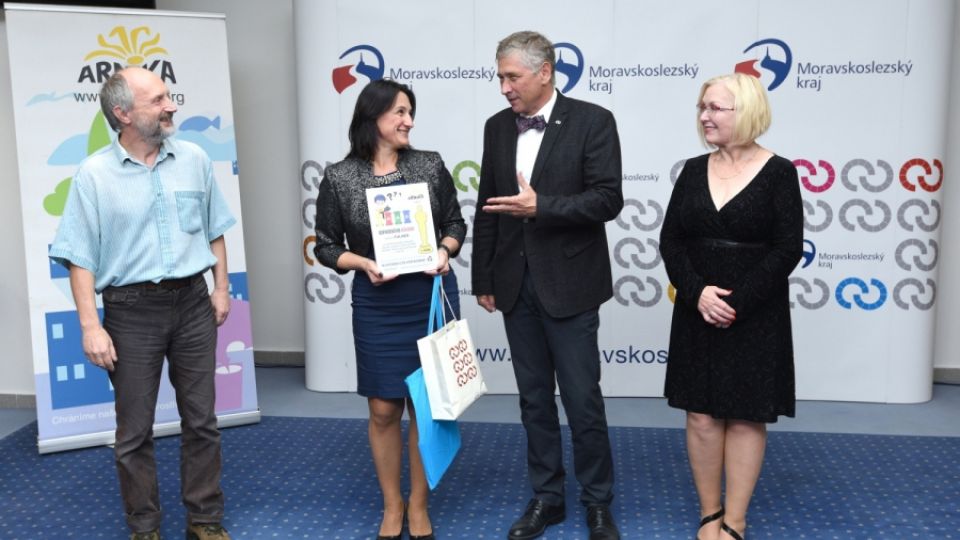The inhabitants of Fulnek won a decisive victory. In the Over 5,000 Inhabitants category, they produce the least municipal waste in the entire republic. They excel at waste separation, but also reuse up to 55% of waste, another excellent accomplishment. Other municipalities in the region also deserve acknowledgment – their representatives were presented the Waste Prevention Oscar at the Regional Council.
The Waste Prevention Oscar has been awarded by Arnika for the 5th time. Its goal is to draw attention to the necessity of responsible waste management and to motivate municipalities to reduce their municipal waste. “Waste disposal is a very important topic in environmental sciences. We must prepare for the upcoming landfill ban right now. Rather than simply adhering to the European legislation, we should focus on our attitude towards the planet and the way we treat it. The people in the Moravian-Silesian Region are increasingly responsible in this regard – fifteen years ago, each of our inhabitants separated 20 kilograms per year on average; last year we reached 47 kilograms of separated waste per person,“ enumerates Ivo Vondrák, the Regional President of the Moravian-Silesian Region, who also added that waste can be separated in all municipalities within the region and the distance of collection points keeps decreasing each year.
“The cities of the Moravian-Silesian Region serve as a proof that people can produce less waste and separate a major part of it. This is partly thanks to the increasing number of collection points, education, open communication with citizens, introducing a program for sole traders and above all various forms of motivating the people. For example by paying only for the real amount of disposed waste or less collection days. As a result, our cities achieve similar results as in other developed countries in Europe,” says Milan Havel, Arnika’s expert on waste management, about the results.
Aside from Fulnek, the other leading towns of the Moravian-Silesian Region include Bocanovice in the Under 1,000 Inhabitants category and Bukovec in the Under 5,000 Inhabitants category. These earned the Waste Prevention Oscars for their efforts, which were presented to the municipal representatives by the Regional President Ivo Vondrák and Deputy Governor for the Environment Jarmila Uvírová on 9 September. The awards were also presented to the representatives of municipalities and cities which placed second or third in three categories based on the number of inhabitants.
“There are over 30 thousand coloured containers for waste separation in the Moravian-Silesian Region, and we are subsidizing new ones. Nearly 300 will be added soon. Bags for separation at home are also popular. Last year we distributed a total of 17 thousand sets of coloured bags within 16 municipalities and 10 thousand sets will be distributed this year. I believe this will motivate the people to try throwing away as little municipal waste as possible,” explains Jarmila Uvírová, Deputy Governor for the Environment, who added that the Waste Prevention Oscar competition could inspire other municipalities to try making their waste management more effective.
Results of municipalities of the Moravian-Silesian Region in 2018
Municipalities with less than 1,000 inhabitants
1. Bocanovice 447 inhabitants – 60.3 kg per person/year, recycling 18%
2. Luboměř 336 inhabitants – 78.6 kg per person/year, recycling 45%
3. Lhotka u Litulovic 198 inhabitants – 82.2 kg per person/year, recycling 29%
Municipalities with 1,001-5,000 inhabitants
1. Bukovec 1391 inhabitants – 85.2 kg per person/year, recycling 30%
2. Rybí 1235 inhabitants – 86.6 kg per person/year, recycling 25%
3. Stěbořice 1423 inhabitants – 107.2 kg per person/year, recycling 45%
Cities with over 5,000 inhabitants
1. Fulnek 5825 inhabitants – 99.1 kg per person/year, recycling 55%
2. Bystřice 5317 inhabitants – 136.6 kg per person/year, recycling 19%
3. Studénka 9867 inhabitants – 147.6 kg per person/year, recycling 40%
________________________________________
Czechia has significantly higher municipal waste production than other developed countries. Its inhabitants produce around 270 kg of garbage each year, compared to 170 kg in Austria or Germany. In these countries, the production fell within 7-10 years after a landfill ban. The time has come for Czechia to focus on effective waste management.
Introducing effective measures could reduce the average annual waste production by up to 50 kg per year for inhabitants and 20-40 kg for small businesses. If a large amount of garbage keeps ending up in the black containers, it will not be possible to reach the goals of circular economy and to gradually raise the utilisation of municipal waste materials to 55, 60, and 65% in the years 2025, 2030, and 2035.







